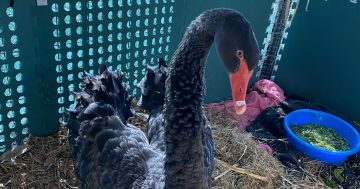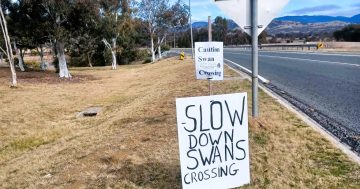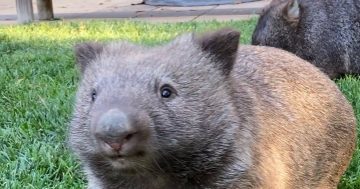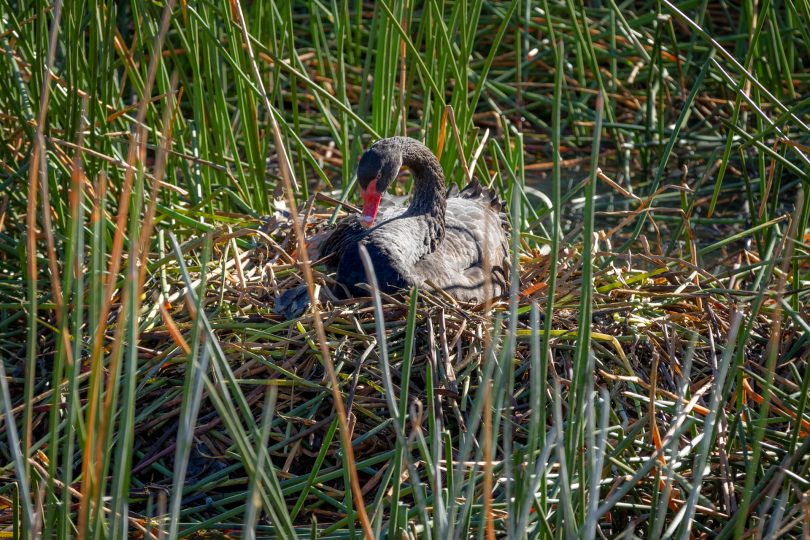
Black Swan sitting on a nest in Norwood Park, Kingston. Photo: Michelle Kroll.
There’s a running joke among local Facebook noticeboards that when members aren’t investigating big bangs and hoodie-clad thieves, they talking about ‘cygnets’.
Those who dismiss the posts with indifference even have a name: ‘cygnet trolls’.
Spring has sprung, which means many things, including warmer days and a congested nose, and more of these cygnet posts. Lockdown is only compounding this, causing us to cling to every nugget of nice news.
For those who don’t know, a cygnet is a baby swan.
The Black Swan (Cygnus atratus) is the only swan species in the ACT, and with their black plumage and red bills, they are a common sight on our lakes, rivers and ponds.
They’re big birds, with adults measuring up to 140 centimetres and weighing 3.7 to 9 kilograms. Males are called cobs, females pens, and the immature offspring, cygnets. Cygnets are usually greyish-brown, gathering more and more black feathers as they get older.
ACT Wildlife volunteer Susan Wishart describes them as the “greediest birds you will ever meet in your life”.
“We’ll struggle to catch a seagull by offering it food, but we can easily catch a black swan.”
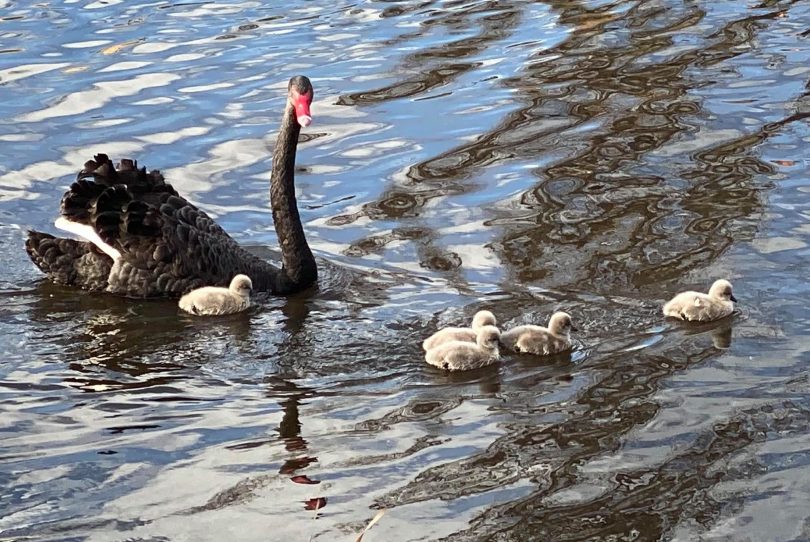
Black Swan with its family of baby swans, or cygnets. Photo: Jenny Frakes.
Black swans are prevalent in many outdoor public parks and with many people making the most of their allotted two hours of outdoor exercise, there’s a rise in attempts to get up close to swan families. This isn’t recommended.
“In principle, ACT Wildlife does not support feeding wild birds. We volunteers might toss corn kernels to them, but that’s so we can catch them and help them with something,” Susan says.
Despite the way they might gobble up bits of bread, it really isn’t good for birds and can lead them to become bloated or overweight. Leftovers can also propagate the growth of algae in waterways.
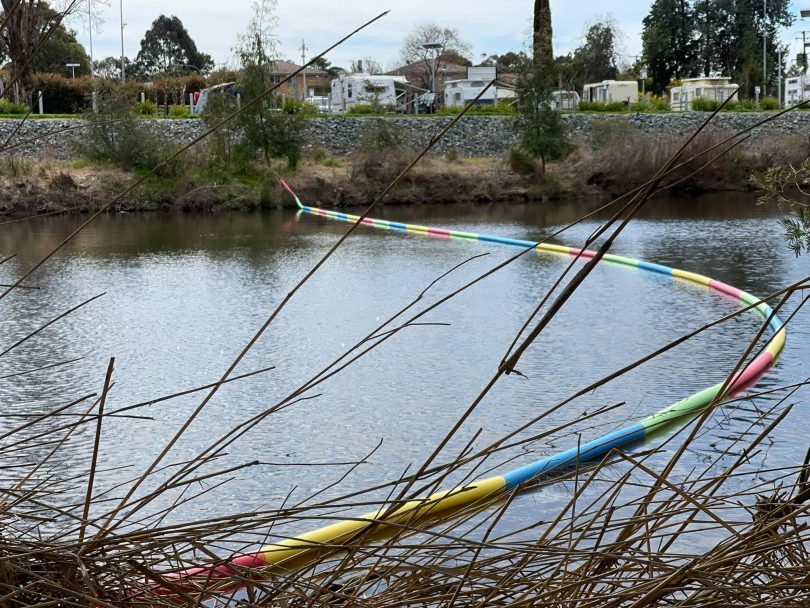
SES and Wildcare volunteers have strung pool noodles across the surface of the water on the Queanbeyan River to prevent cygnets from washing downstream and over the weir. Photo: Ricardo Mendonca.
Divebombing magpies might be the usual suspect when it comes to aggressively protecting their young, but Susan says swans can be equally defensive.
“The bite of a black swan might not be that bad, but the big and muscular wings can do a fair bit of bruising. Don’t ever let your kids near an adult swan, regardless of whether or not they have cygnets. Don’t ever approach cygnets unless you think something is wrong.”
If you do see anything you think might be wrong with a swan, ring ACT Wildlife for advice, but Susan also says to bear in mind that swans sometimes sit in the oddest of positions.
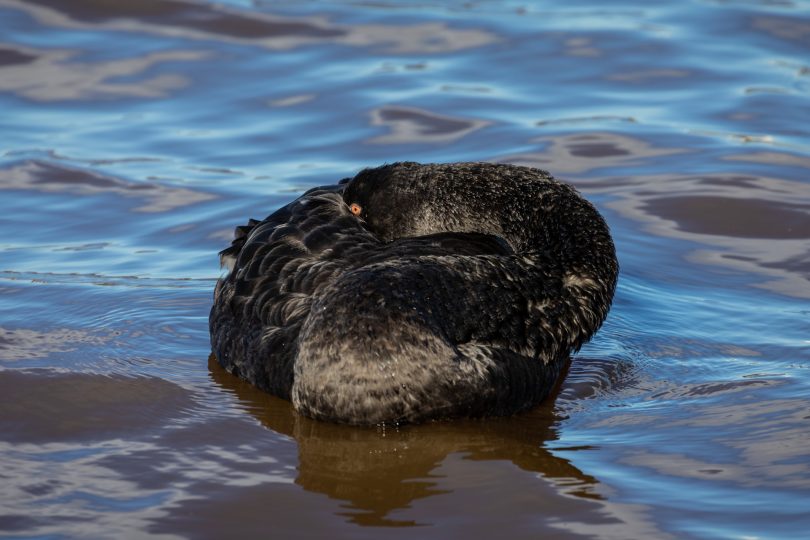
Black Swan on Lake Burley Griffin doing its best without having a face mask. Photo: Michelle Kroll.
“We get a few call-outs where the person says the swan has a badly-injured leg, and we’ll go out and look but it will just be the swan sticking its leg out and doing ‘swan things’, goodness knows what.”
Entanglement in fishing gear is the number-one reason volunteers are called out to rescue swans. Susan reminds fishers to ensure they don’t leave any of their gear behind.
Living in the ‘bush capital’, it’s inevitable that we brush with all sorts of nature in all its stages. But the clear message to residents is to leave young birds alone unless they are in obvious danger.
“If the parents are around, construct a ‘fake nest’ using an old ice-cream-type container with little holes at the bottom and lined with paper towel, and keep an eye on it to make sure the parents are still feeding. If it’s a fully-feathered fledgling, it’s probably still learning to fly, so generally, put it on a branch and the parents should still come to feed.”
If no parents are in sight after an hour or more, then contact ACT Wildlife, although Susan adds that parrots may not return to their young for several hours.
What you must not do is try to raise a baby bird by yourself. Due to their specific dietary requirements that your pantry will find very difficult to match, keeping a native bird for more than 48 hours is illegal in the ACT unless you are a licensed or trained wildlife carer.
If you come across injured, sick, or orphaned wildlife, call the ACT Wildlife 24/7 hotline on 0432 300 033.












